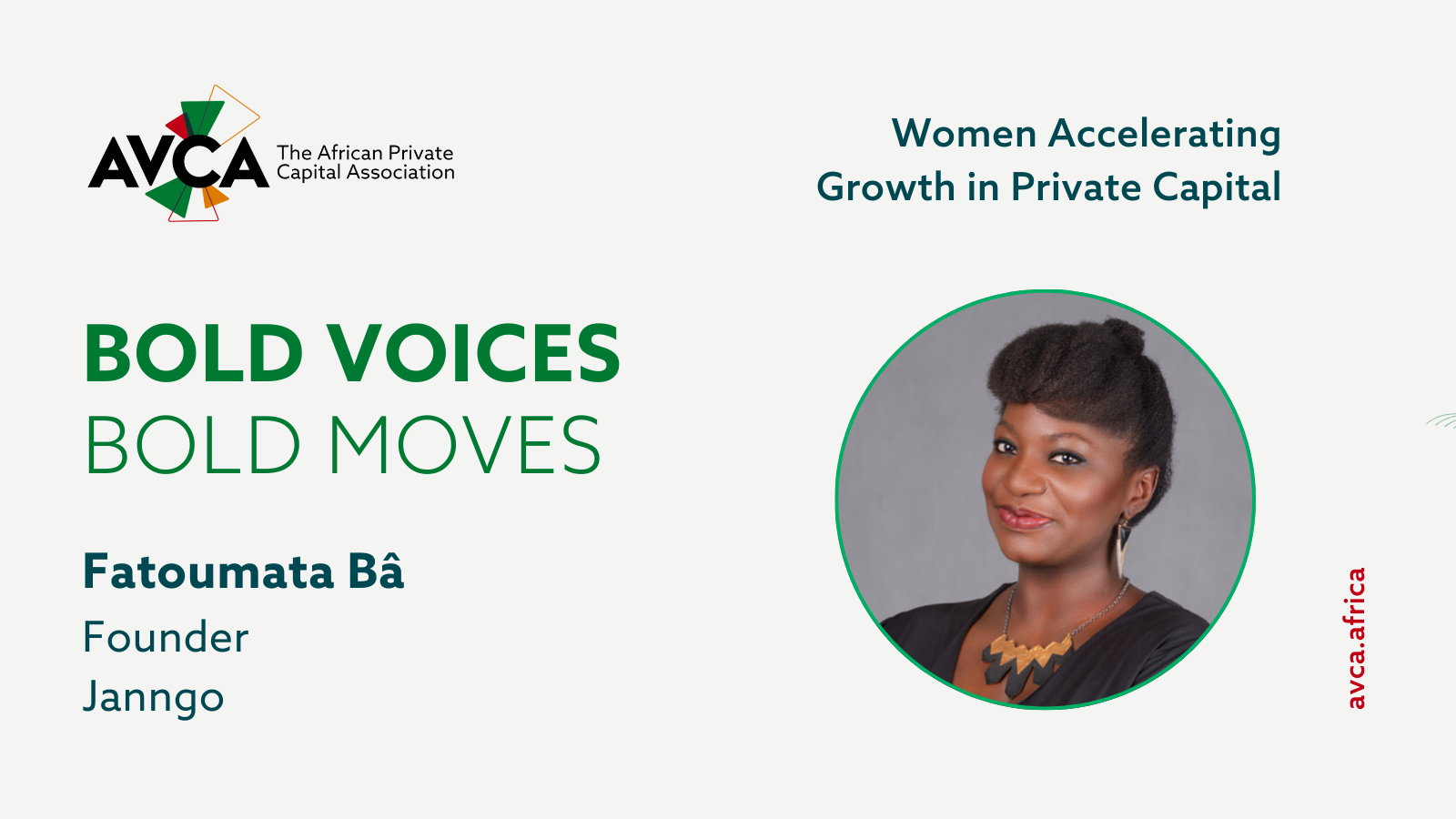Bold Voices, Bold Moves: Spotlight on Fatoumata Bâ – Founder & Executive Chair, Janngo Capital
Fatoumata Bâ is a tech entrepreneur and VC investor who founded Janngo Capital to build, grow and invest in pan-African 'tech for good' champions. Previously, she served as a founding executive at Jumia, Africa's first tech unicorn listed on the NYSE, where she drove performance across 130+ operations in 30+ countries. A World Economic Forum Young Global Leader and Forbes Africa '30 under 30' honoree, Fatoumata is passionate about leveraging technology for development in Africa, particularly supporting women's entrepreneurship, SME growth and addressing healthcare and education challenges.

In your view, what is the most pressing challenge facing the VC ecosystem right now?
One of the most urgent challenges in today’s VC ecosystem is the lack of capital flowing to diverse founders—particularly women-led and Africa-based startups. Despite the well-documented correlation between diversity and strong performance—diverse teams consistently outperform in terms of innovation and returns—less than 2% of global VC funding reaches female founders, and Africa receives only about 0.7% to 1% of global private equity and venture capital investments. This funding gap is especially stark given the high-impact potential of African startups that are leveraging technology to solve critical challenges in healthcare, education, climate, and financial inclusion.
At Janngo Capital, we invest 100% of our proceeds in African tech startups and are deeply committed to bridging the gender gap. Currently, over 50% of our portfolio companies are founded, co-founded by women, or benefiting women.
What’s needed now is bold, intentional capital allocation: LPs and investors must embed gender and geographic inclusion as core investment criteria—not as an afterthought. That means dedicating funds to first-time and diverse fund managers, rewarding inclusive investment strategies, and reframing risk perceptions around emerging markets and underrepresented founders.
Africa’s growth and innovation potential cannot be unlocked without its women. It’s time to stop asking whether they can lead and start ensuring they have the resources to do so.
Which sectors offer promising opportunities for investment amid macroeconomic challenges?
Amid ongoing macroeconomic challenges, the most promising investment opportunities lie precisely in the sectors where structural gaps are most acute—because where problems persist, innovation has the greatest potential for impact and scale.
In Africa, this includes sectors such as healthcare, where access remains limited and fragmented; education, where digital tools can bridge quality and inclusion gaps; logistics and mobility, which are essential to unlocking intra-continental trade; agriculture, where technology can drive productivity and food security; and financial services, particularly in expanding access to underserved populations.
These sectors are not only critical to the continent’s long-term development—they also represent fertile ground for tech-enabled startups that offer scalable, locally relevant solutions. By addressing pain points such as inefficiency, informality, or lack of access, these ventures can build sustainable business models while delivering tangible impact.
As investors, the imperative is clear: to allocate capital toward innovation that directly responds to the real economy’s most pressing needs—turning adversity into opportunity, and constraints into catalysts for inclusive growth.
We're currently witnessing increased scrutiny of diversity and inclusion initiatives globally. How should the African private capital industry maintain momentum on gender equity in the face of fluctuating commitment?
While diversity and inclusion face growing global scrutiny, we are witnessing a regression in support for women entrepreneurs—particularly in markets like the U.S., where funding for women-led startups fell from 28% in early 2023 to just 17% in the first half of 2024. At the same time, gender lens investing is progressing unevenly across geographies.
Yet in Africa, the case for investing in women is not only a matter of equity—it’s a matter of economic necessity and opportunity. Women are central to Africa’s development: they are overrepresented among informal entrepreneurs, primary caregivers, and often the backbone of their communities. The African Development Bank estimates that closing the gender gap could unlock up to US$42bn in GDP—and, according to McKinsey, potentially boost the continent’s GDP by more than 10% by 2025. Investing in women, therefore, means investing in resilient, inclusive growth.
To maintain momentum, the African private capital industry must resist the temptation to follow global fluctuations in commitment. Instead, we should double down on gender-intentional strategies—by channeling capital toward women-led businesses, supporting gender-diverse fund managers, and measuring impact with a gender lens.
At Janngo Capital, over 50% of our portfolio meets these criteria, not as a concession, but as a strong commitment: women are not just part of the solution—they are the solution. Africa cannot afford to overlook its most powerful engine of progress.
Which bold move have you taken in your career that created unexpected opportunities for you or others in the industry?
One of the boldest moves I made in my career was leaving a high-level corporate position to co-found Jumia in its early days—at a time when the African tech ecosystem was still in its infancy, and very few believed in the scalability of digital ventures on the continent. It was a risk, but we made it become the first African unicorns, paving the way for a generation of tech entrepreneurs.
Later, founding Janngo Capital was another defining leap. I wanted to go beyond building one company and instead back dozens—especially those founded or led by women, solving real problems in healthcare, education, agriculture, and financial inclusion. At the time, a VC fund with a 100% Africa focus, a strong commitment on gender, and a double-bottom line approach was still seen as unconventional.
These choices opened doors not just for me, but for other women entrepreneurs across Africa. They also helped shift narratives—from aid to investment, from risk to opportunity, and from exclusion to inclusion.
What I’ve learned is this: when you build boldly and intentionally, you don’t just create value—you help redefine what’s possible.